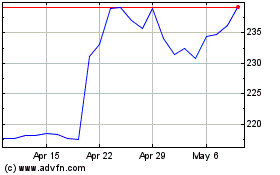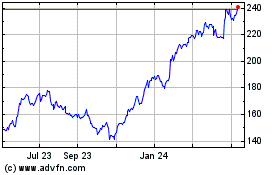American Express Advances in Effort to Access China Market
April 25 2018 - 11:02AM
Dow Jones News
By Lingling Wei and Chao Deng
BEIJING -- American Express Co. cleared a hurdle in its
yearslong effort to operate in China, potentially becoming the
first U.S. card network to receive permission to offer services in
the Chinese market.
China's central bank informed the New York-based card issuer
that it will "formally accept" its application to clear and settle
domestic bank-card transactions, an Amex spokesman said. The firm
has applied to do so by forming a joint venture with a Chinese
mobile-payment provider, Lianlian Group, said the spokesman, Fritz
Quinn. People close to the central bank confirmed officials have
given "verbal acceptance" to AmEx's application.
Obtaining such regulatory consent marks an important, if only an
initial step toward gaining a foothold in China's fast-growing
electronic-payment market. Chinese authorities hope to tout AmEx's
application as an example of progress in opening its markets when
President Donald Trump's top economic advisers travel to Beijing
next week to try to settle escalating trade disputes, according to
people involved in China's decision-making.
AmEx's decision to take on a Chinese partner -- instead of
forming a wholly owned entity -- shows the difficulties foreign
firms face in going solo in a market where the government holds
sway, said analysts and industry experts. Barriers to foreigners
have been high for so long that Chinese institutions now thoroughly
dominate many sectors, especially in finance -- be they for payment
services, credit rating, brokerages or banking -- sectors where
China has said greater foreign participation would be allowed.
Authorities "aren't establishing a level playing field," said
Lester Ross, a Beijing-based lawyer at WilmerHale, who advises U.S.
businesses operating in China. Instead, he said, they're "opening a
door but only for firms to crawl through."
Opening the market to foreign card companies was a pledge
Beijing made a dozen years ago. It still hadn't done so when
Beijing promised "full and prompt" market access as part of a quick
"100-day" market-opening package made after a summit between
President Donald Trump and President Xi Jinping a year ago.
Credit-rating, brokerage and financial firms are all areas Beijing
has over the past year said greater foreign participation would be
allowed, but where foreign executives complain that licensing and
other regulatory roadblocks leave those promises unfulfilled.
China already has 6.7 billion bank cards in circulation, with
government-owned China UnionPay Co. commanding more than 90% of the
domestic market.
Joint ventures, like the one being formed by AmEx, have drawn
particular ire from some Trump administration officials who see
them as a tool China uses to reduce American companies' profits and
siphon off their technical know-how.
The AmEx spokesman, Mr. Quinn, said the firm's strategy has
always been to form a joint venture in China. AmEx has worked with
Lianlian as far back as 2012, providing technologies to power
Lianlian's digital wallets, which Chinese consumers can use to top
up mobile phone minutes and pay bills with. "For any foreign
business doing business, it's nice to have some help," Mr. Quinn
said.
In addition to AmEx, Mastercard Inc. has also formed a
partnership with three Chinese entities and has applied with the
central bank to conduct card-clearing and settlement transactions
in the country, according to people with knowledge of the matter.
Its joint-venture application so far hasn't been accepted by the
People's Bank of China, the people said.
"Do they have a preference?" one of the people said, referring
to the question of whether the government prefers that foreign
companies find local partners. "You have to feel it for
yourself."
Visa Inc. recently has withdrawn and resubmitted its application
to form a wholly owned entity in China, according to people
familiar with the matter. The refiling came after senior Visa
executives met with People's Bank governor Yi Gang in late March,
the people said. So far, the firm's application hasn't been
accepted by the central bank, the people added, and Visa is also
weighing potentially teaming up with Chinese banks as way to get
into Chinese market if it doesn't get the green light to proceed
with the application.
A Visa spokeswoman said the company would continue to work
through the application process and is committed to China for the
long run. She declined to elaborate.
Even with the informal acceptance of its application by the
central bank, AmEx still needs to overcome other hurdles to be able
to start operating in China. It has to go through a rather-murky
national-security review process, the people with knowledge of its
application procedure said. The firm could face more than a year
before it can get its local business running, because the
government also requires the joint-venture company to put data
centers and other processing systems in place before seeking a
final approval.
Meanwhile, another group promised fast progress as part of the
Trump-Xi "100-day" plan- -- global credit-rating companies -- are
still struggling with local barriers. As part of that agreement,
China was supposed to allow wholly owned foreign rating firms to
provide credit assessment services in the country by July 2017. So
far, none of the big three raters -- S&P Global Inc., Moody's
Investors Service and Fitch Ratings -- has applied, according to
people with knowledge of the process.
One major obstacle is a request that they adopt domestic rating
standards that tend to give local companies loftier grades than
they would likely receive under the foreign firms' global
standards, these people said. S&P declined to comment. Moody's
and Fitch said they welcomed the regulatory changes.
--
Yang Jie
and AnnaMaria Andriotis contributed to this article.
Write to Lingling Wei at lingling.wei@wsj.com and Chao Deng at
Chao.Deng@wsj.com
(END) Dow Jones Newswires
April 25, 2018 10:47 ET (14:47 GMT)
Copyright (c) 2018 Dow Jones & Company, Inc.
American Express (NYSE:AXP)
Historical Stock Chart
From Mar 2024 to Apr 2024

American Express (NYSE:AXP)
Historical Stock Chart
From Apr 2023 to Apr 2024
